KINGS of MACEDON. Aeropos (398/7-395/4 BC). AE Chalkous.
Obv: Male head right, wearing petasos.
Rev: ΑΕΡΟΠΟ.
Forepart of lion right.
AMNG III, 3; SNG ANS 80-81; Westermark, Remarks 4.
Condition: Good fine.
Weight: 1.80 g.
Diameter: 12 mm.


"A varied collection of Ancient Coins with a specialty in Boeotian Coinage."
Coinage of the Boeotians
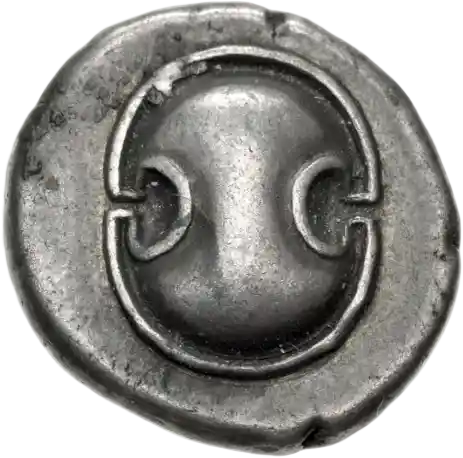
24 Best coins, why that number? Its because that's what fits on a numi...
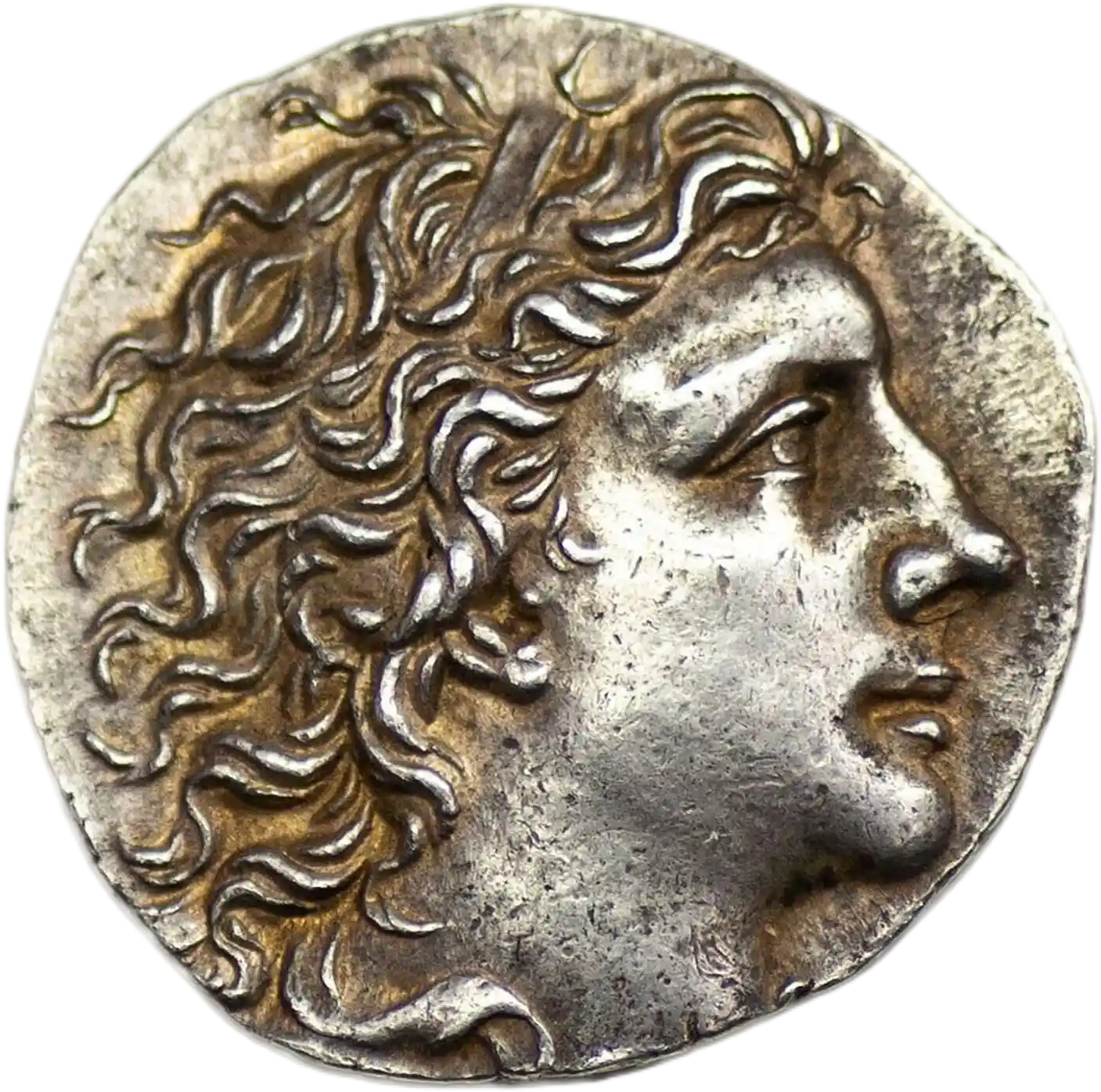
Top 10 coins purchased in 2025
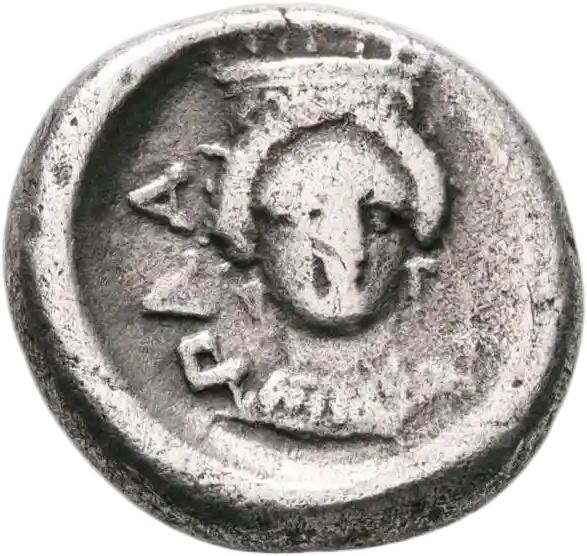
Top 10 coins acquired in 2024
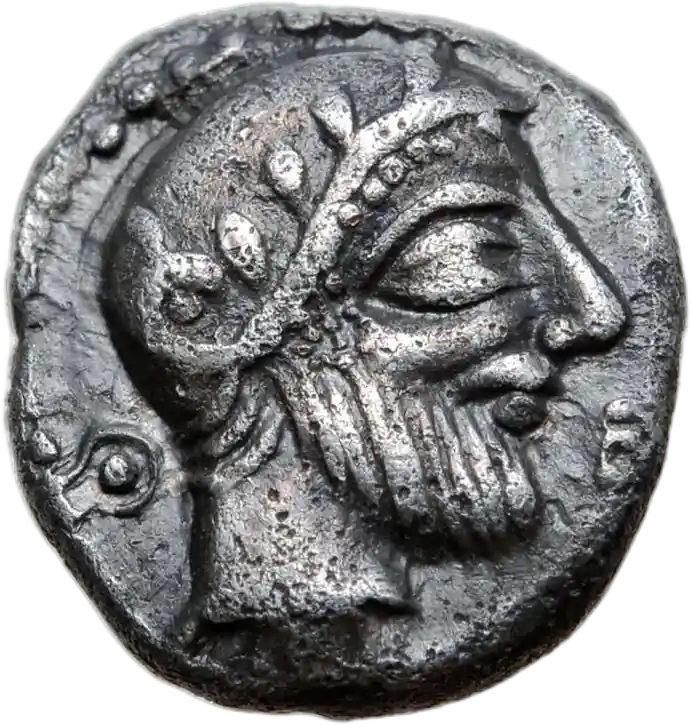
Coinage of Northern, Central and Sourthern Greece
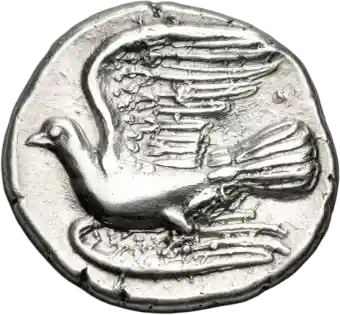
Coinage of the Greek Islands: Cyclades, Dodecanese, Ionian.
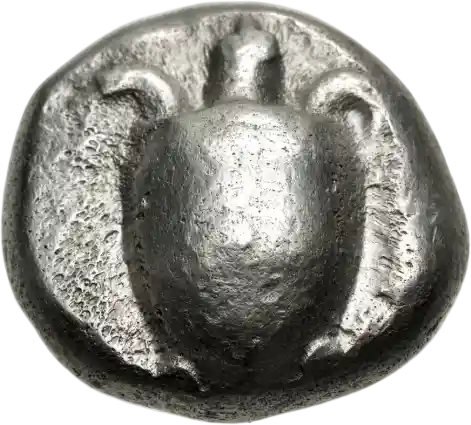
Coinage east of Thrace
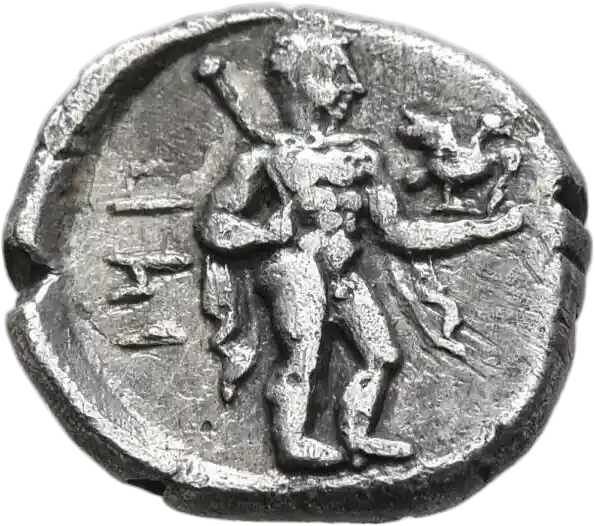
Coinage and various denominaitons of Hadrian
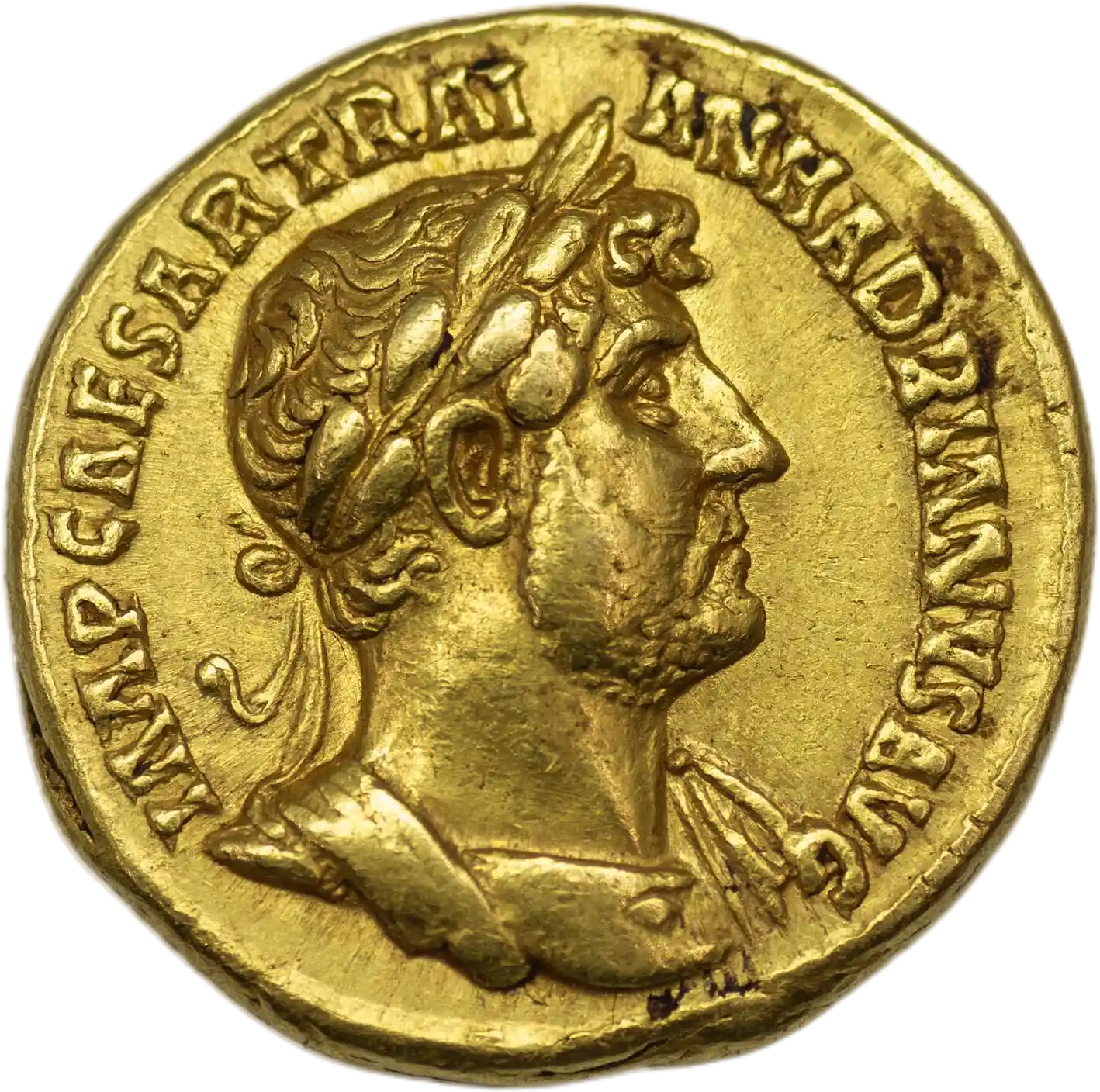
Coins until 27 BC from Rome
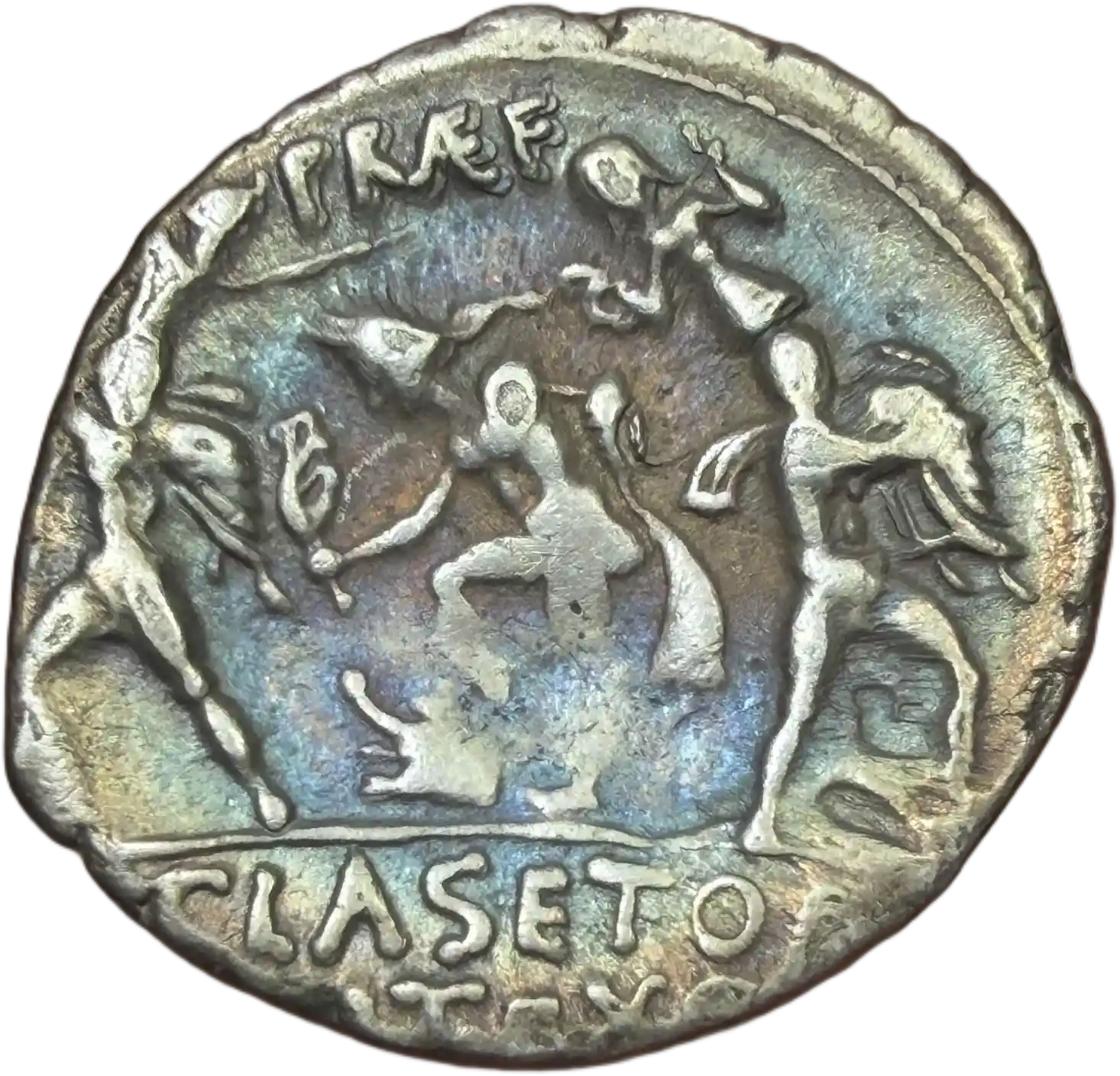
Coinage of Southern Italy and Sicily
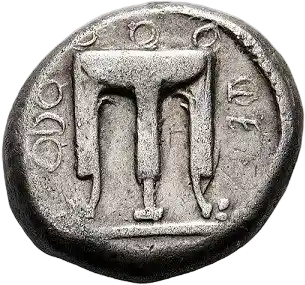
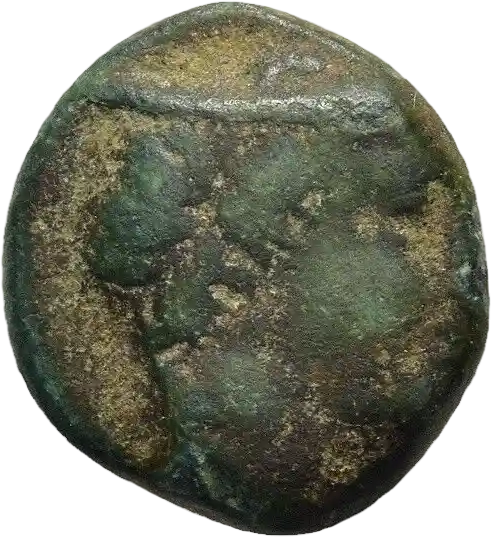
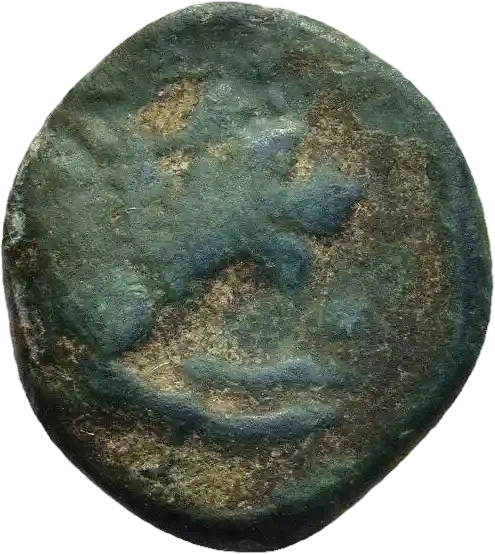
| Description |
KINGS of MACEDON. Aeropos (398/7-395/4 BC). AE Chalkous. |
| Obverse | Male head right, wearing petasos. |
| Reverse | ΑΕΡΟΠΟ. Forepart of lion right |
| ID(s) | AMNG III, 3; SNG ANS 80-81; Westermark, Remarks 4. |
| Weight | 1.80g |
| Diameter | 12.00mm |
| Grade | Good Fine/GF |
| Year(s) Minted | Struck: 398 BC - 394 BC |
No Links Associated.
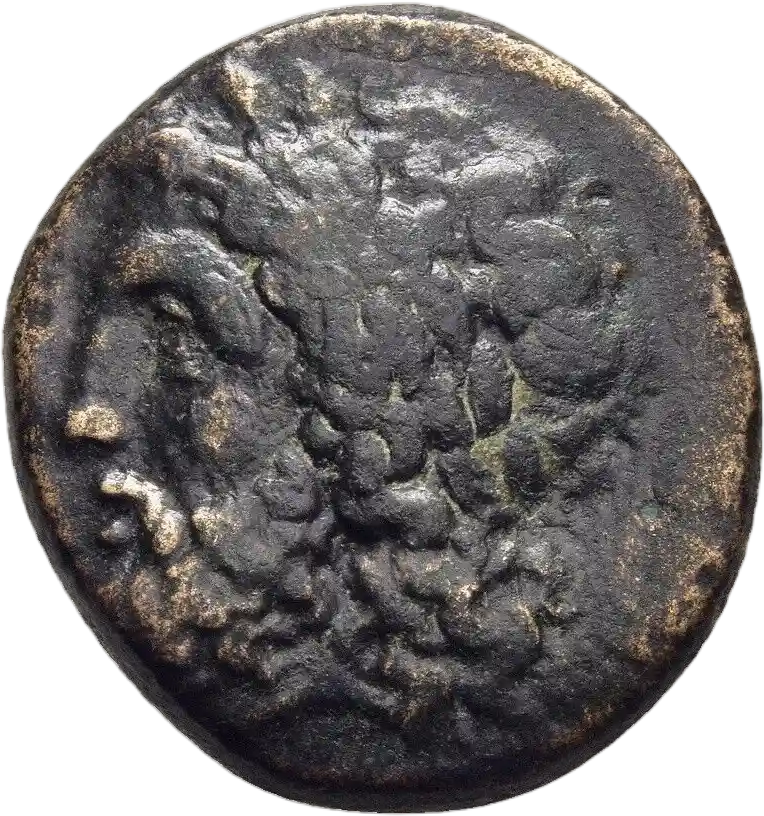
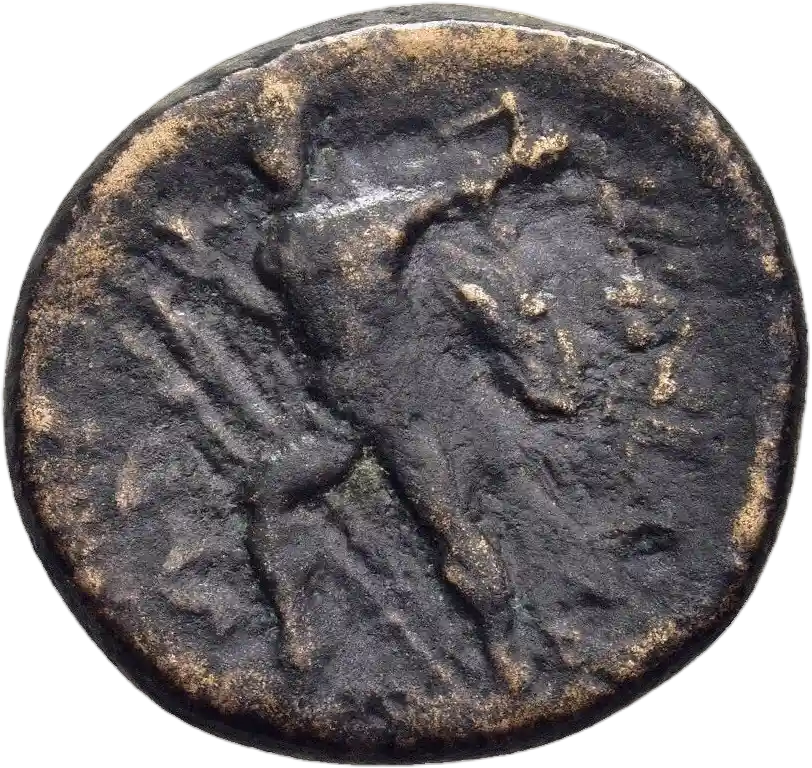
| Description |
THESSALY. Ainianes. Ae Dichalkon (late 4th-early 3rd centuries BC) |
| Obverse | Laureate head of Zeus left. |
| Reverse | ΑΙΝΙΑΝΩΝ. Phemios shooting sling right; two spears in background. |
| ID(s) | BCD Thessaly 31.1; HGC 4, 50. |
| Weight | 5.43g |
| Diameter | 19.00mm |
| Grade | Fine/F |
| Year(s) Minted | Struck: 325 BC - 275 BC |
No Links Associated.
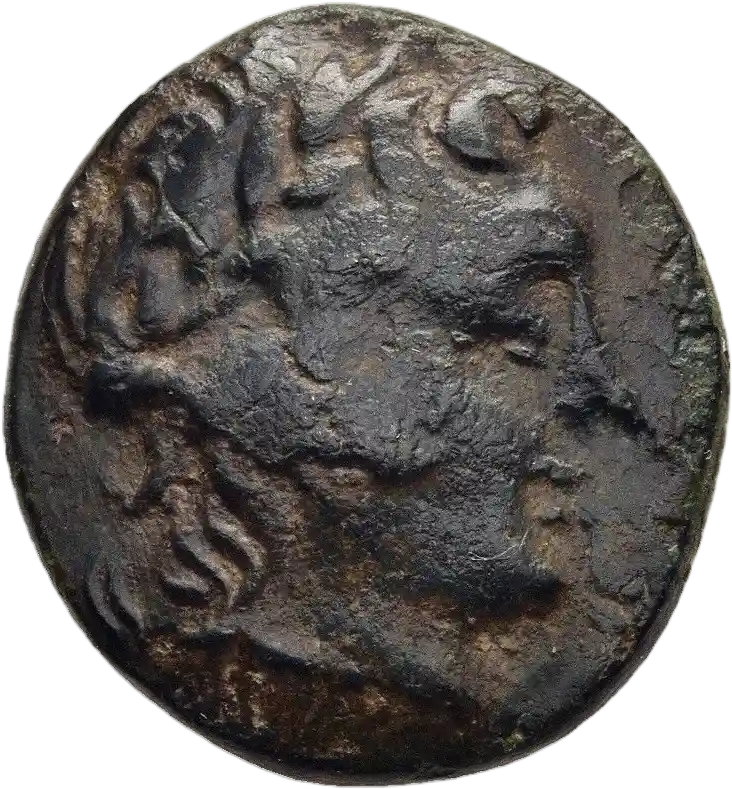
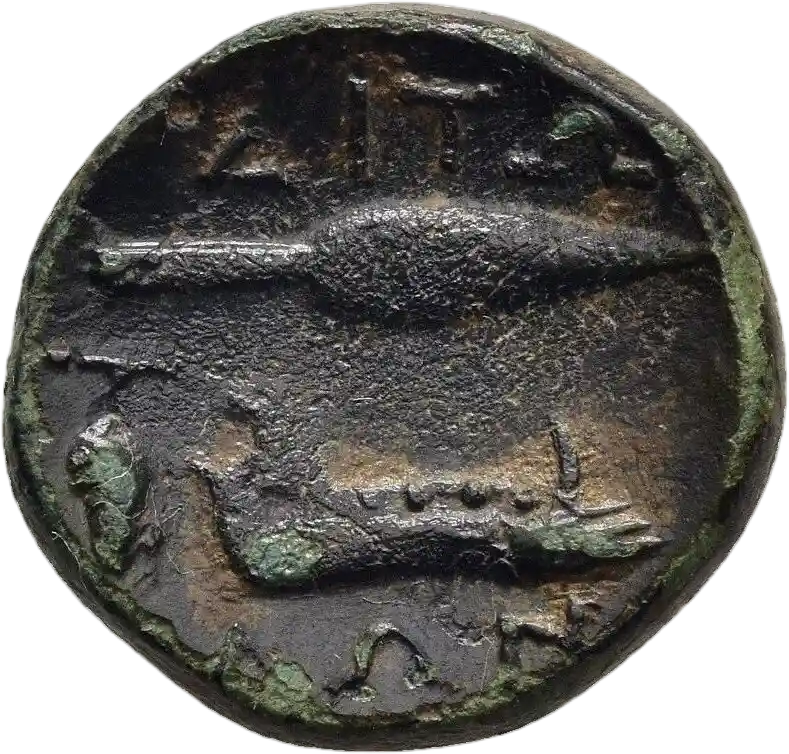
| Description |
AITOLIA. Aitolian League. Ae Hemiobol (circa 290-220 BC) . |
| Obverse | Laureate head of Apollo right. |
| Reverse | AITΩΛΩN. Spear head right above jawbone of Calydonian boar right. Control: in left field, grape. |
| ID(s) | BCD Aitolia 536-9. |
| Weight | 5.38g |
| Diameter | 18.00mm |
| Grade | Good Very Fine/gVF |
| Year(s) Minted | Struck: 290 BC - 220 BC |
No Links Associated.
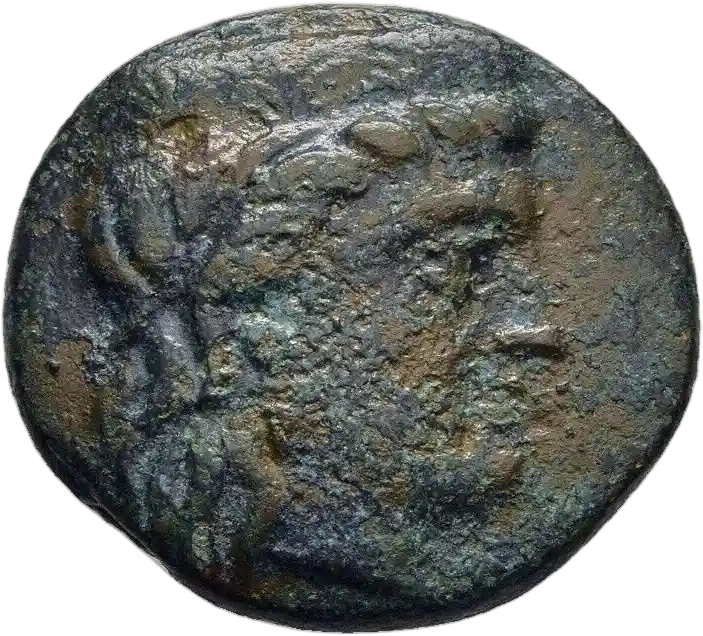
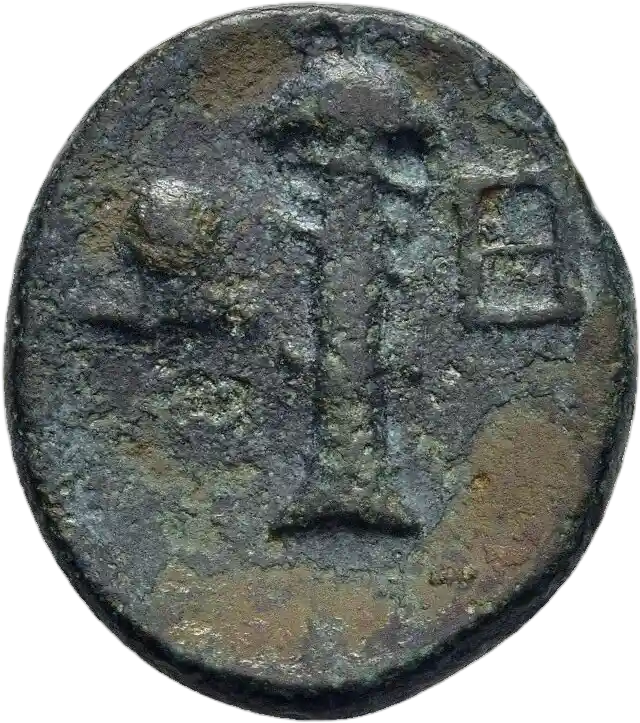
| Description |
ARGOLIS. Argos. Ae (late 3rd-early 2nd centuries BC). |
| Obverse | Head of Hera right, wearing ornamented stephanos. |
| Reverse | Pillar fountain; helmet to left, archaic heta to right. |
| ID(s) | BCD Peloponnesos 1124–6; HGC 5, 699. |
| Weight | 3.18g |
| Diameter | 17.00mm |
| Grade | Fine/F |
| Year(s) Minted | Struck: 225 BC - 175 BC |
No Links Associated.
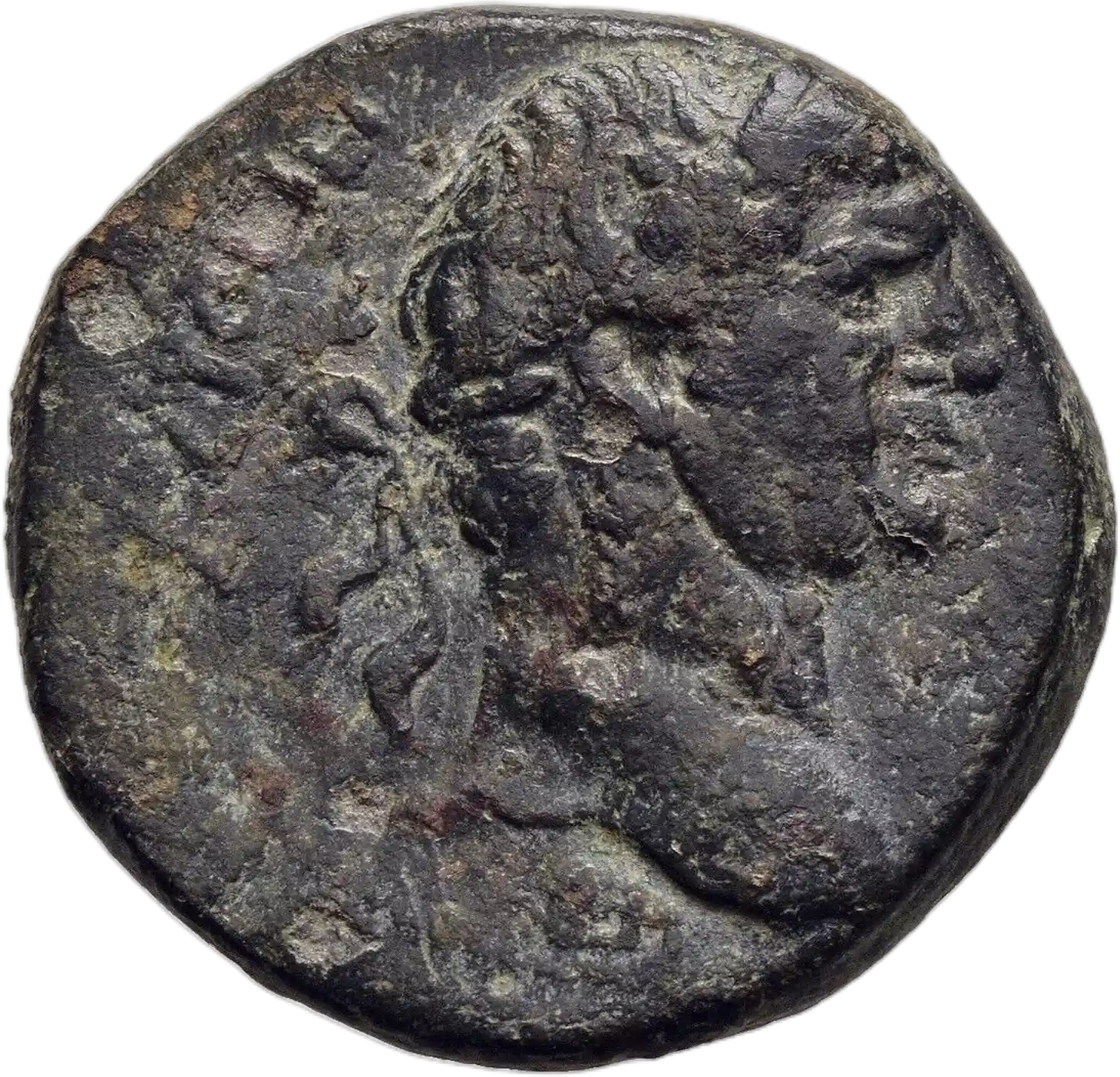
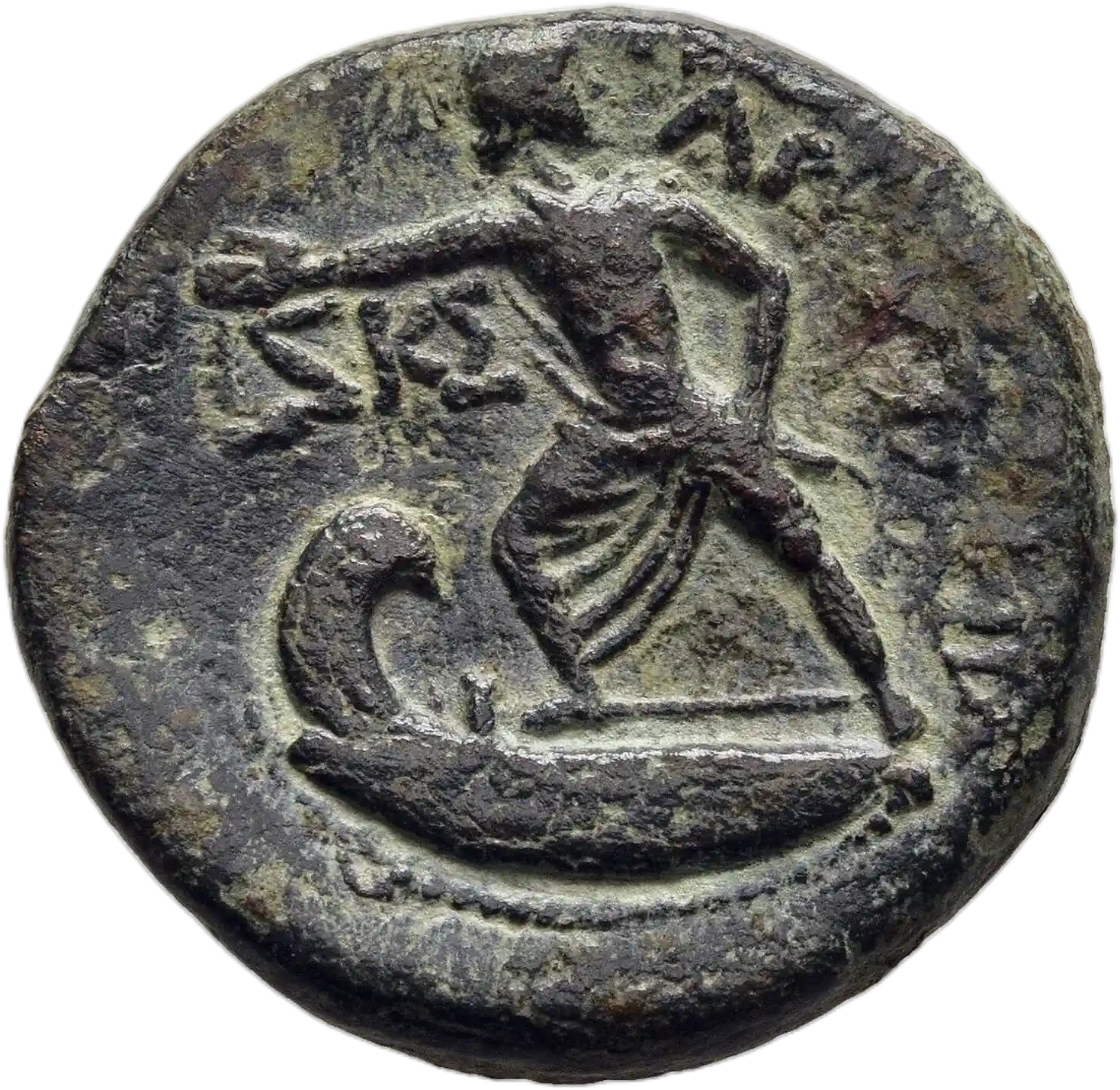
| Description |
PHOENICIA. Sidon. Trajan (98-117). Ae. Dated CY 227 (AD 117). |
| Obverse | ΑΥΤΟ ΝΕΡ ΤΡΑΙΑΝΩ ΚΑΙ. Laureate head right. |
| Reverse | ΣΙΔΩΝΟΣ ΝΑΥΑΡΧΙΔΟΣ. Cadmus advancing left on prow, looking back, pointing forward with his extended right hand, holding cloak about his waist; L ΖΚΣ (date) to left. |
| ID(s) | RPC III 3866. |
| Weight | 11.53g |
| Diameter | 23.00mm |
| Grade | About Very Fine/aVF |
| Year(s) Minted | Struck: 117 AD |
No Links Associated.
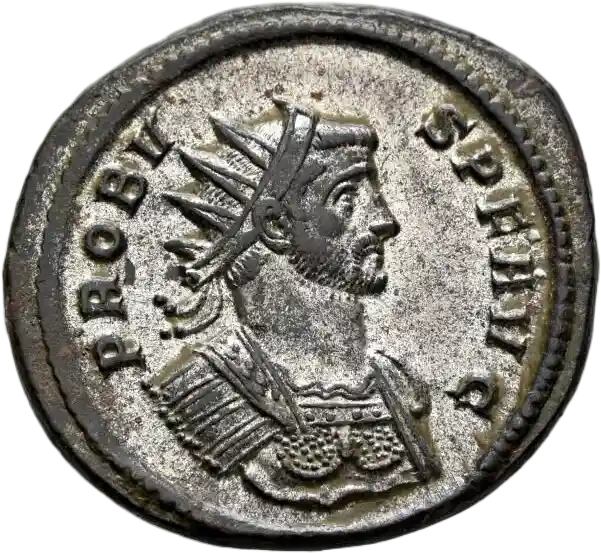
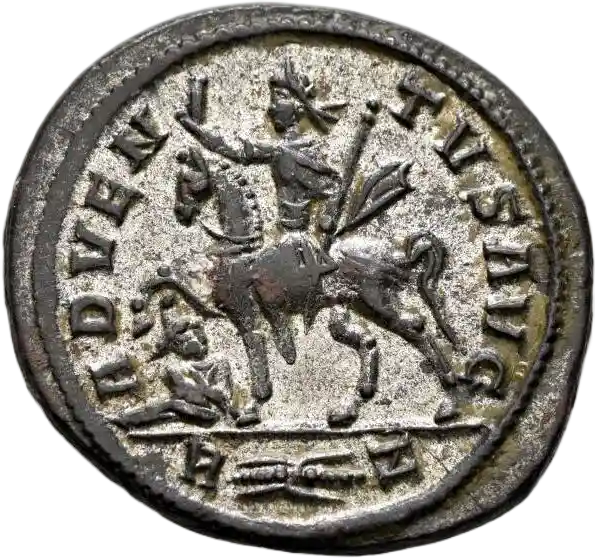
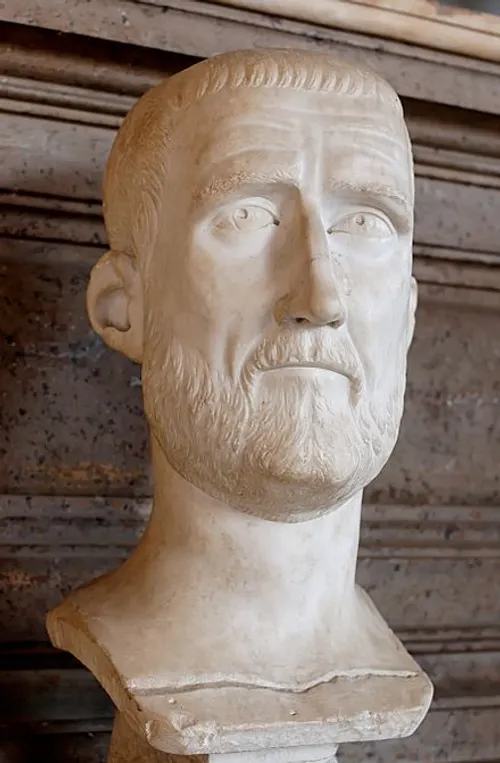
| Description |
Probus, 276-282. Antoninianus (Silvered bronze, 23 mm, 4.89 g, 5 h), Rome, 281. PROBVS P F AVG Radiate and cuirassed bust of Probus to right. Rev. ADVENTVS AVG / R(thunderbolt)Z Probus on horseback to left, raising his right hand in salute and holding long scepter in his left; to left on ground, bound captive seated to left, head right. Cohen -. RIC 158. Very light deposits*, otherwise,* good very fine. From the collection of Martinus J. L. Janssen, ex Roma E-Auction 72, 25 June 2020, 1378, and from the Brian Henry Grover Collection, acquired in 1983. |
| Obverse | PROBVS P F AVG Radiate and cuirassed bust of Probus to right. |
| Reverse | ADVENTVS AVG / R(thunderbolt)Z Probus on horseback to left, raising his right hand in salute and holding long scepter in his left; to left on ground, bound captive seated to left, head right. |
| ID(s) | Cohen -. RIC 158. |
| Die Axis | 5h |
| Weight | 4.89g |
| Diameter | 23.00mm |
| Grade | Good Very Fine/gVF |
| Year(s) Minted | Struck: 281 AD |
No Links Associated.
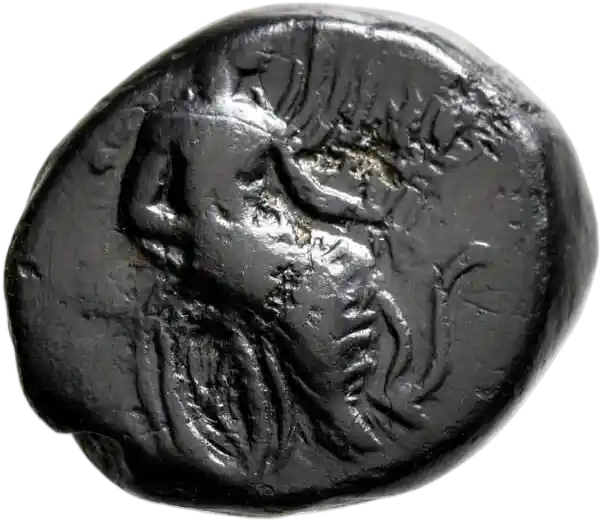
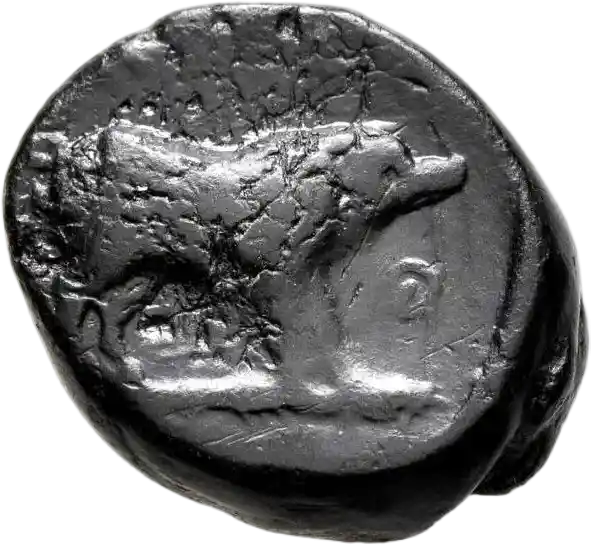
| Description |
ATTICA. Athens. Circa 340-335 BC. Dichalkon (Bronze, 16 mm, 4.00 g, 11 h), Eleusis. Triptolemos, holding grain ear in his left hand, seated right in winged chariot drawn by two serpents. Rev. [EΛEYΣI] Pig standing right on mystic staff; to right, Θ. HGC 4, 1766 var. Kroll -. Svoronos, pl. 103, 15. Very rare. Struck from slightly worn dies and with minor corrosion*, otherwise,* about very fine. From the collection of the Hamburg-based Psychologist and Educational Scientist, Prof. Dr. Paul Probst, ex Naumann E-Auction 86, 20 February 2020, 127 and Peus 423, 7 November 2018, 51. |
| Obverse | Triptolemos, holding grain ear in his left hand, seated right in winged chariot drawn by two serpents. |
| Reverse | [EΛEYΣI] Pig standing right on mystic staff; to right, Θ. |
| ID(s) | HGC 4, 1766 var. Kroll -. Svoronos, pl. 103, 15. |
| Die Axis | 11h |
| Weight | 4.00g |
| Diameter | 16.00mm |
| Grade | About Very Fine/aVF |
| Year(s) Minted | Struck: 340 BC - 335 BC |
No Links Associated.
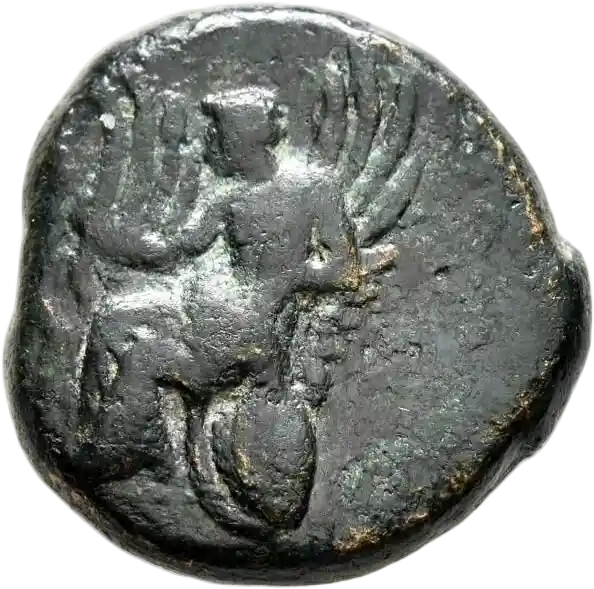
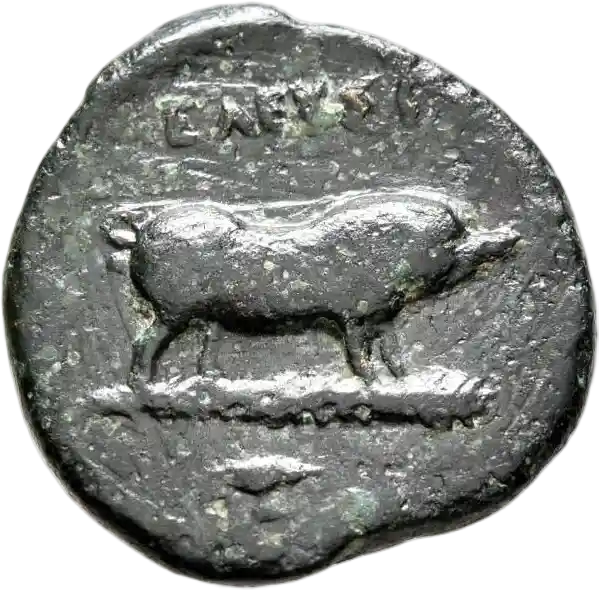
| Description |
ATTICA. Athens. Circa 340-335 BC. Dichalkon (Bronze, 17 mm, 4.23 g, 10 h), Eleusis. Triptolemos, holding grain ear in his right hand, seated left in winged chariot drawn by two serpents. Rev. EΛEYΣI Pig standing right on mystic staff; in exergue, boukranion. HGC 4, 1764. Kroll 38h. SNG Copenhagen 415. Minor traces of corrosion and with faint scratches*, otherwise,* good fine. From the collection of the Hamburg-based Psychologist and Educational Scientist, Prof. Dr. Paul Probst, ex Savoca E-Auction 13, 12 March 2017, 130. |
| Obverse | Triptolemos, holding grain ear in his right hand, seated left in winged chariot drawn by two serpents. |
| Reverse | EΛEYΣI Pig standing right on mystic staff; in exergue, boukranion. |
| ID(s) | HGC 4, 1764. Kroll 38h. SNG Copenhagen 415. |
| Die Axis | 10h |
| Weight | 4.23g |
| Diameter | 17.00mm |
| Grade | Good Fine/GF |
| Year(s) Minted | Struck: 340 BC - 335 BC |
No Links Associated.
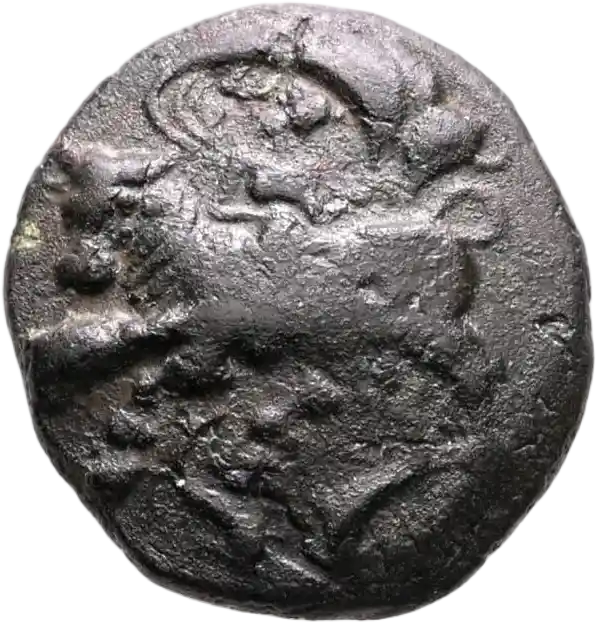
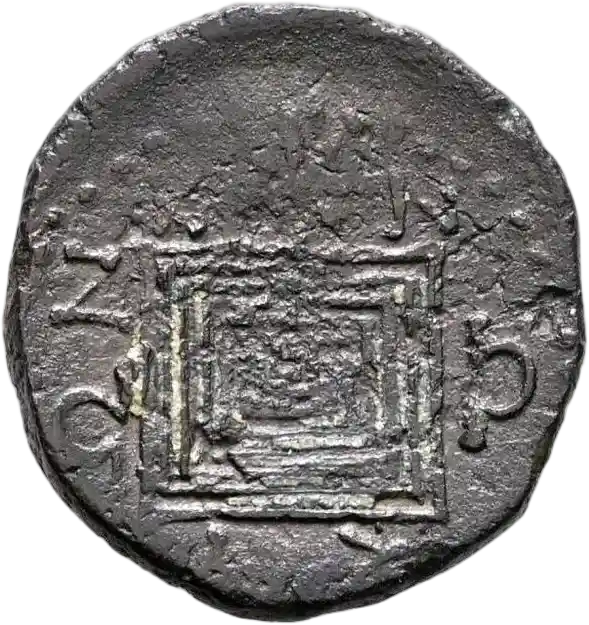
| Description |
CRETE. Knossos. Circa 220 BC. AE (Bronze, 16 mm, 2.51 g). Europa riding bull to left; in exergue, two dolphins confronted. Rev. ΚΝ-Ω-ΣΙ-ΩΝ Labyrinth; above, star. BMC 36. SNG Copenhagen 378. Svoronos, Numismatique 122. Slightly rough and struck from a somewhat worn obverse die and with minor corrosion on the reverse*, otherwise,* good fine. From the private collection of the Swiss Archaeologist Philipp Reto Huser (1962-2025), privately acquired in Swiss coin trade over the past 30 years. |
| Obverse | Europa riding bull to left; in exergue, two dolphins confronted. |
| Reverse | ΚΝ-Ω-ΣΙ-ΩΝ Labyrinth; above, star. |
| ID(s) | BMC 36. SNG Copenhagen 378. Svoronos, Numismatique 122. |
| Weight | 2.51g |
| Diameter | 16.00mm |
| Grade | Good Fine/GF |
| Year(s) Minted | Struck: 220 BC |
No Links Associated.
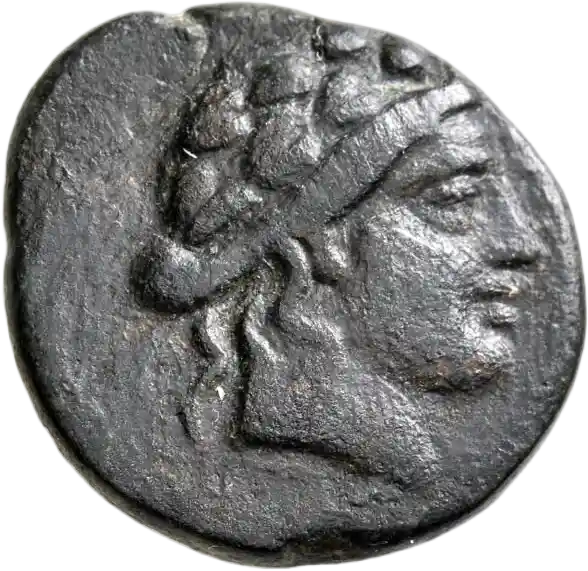
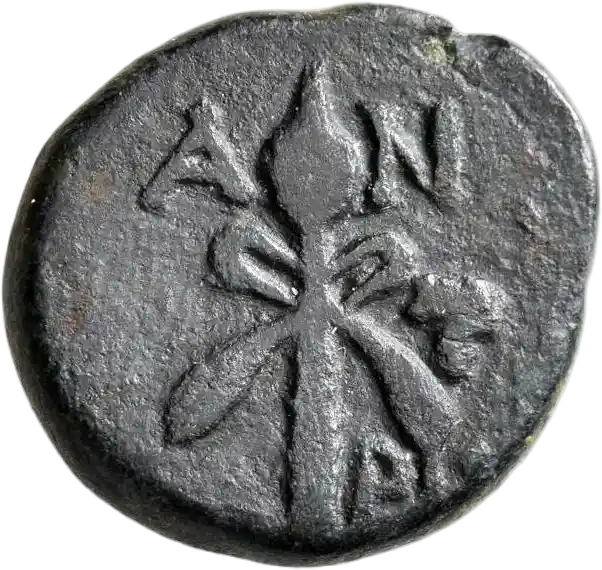
| Description |
CYCLADES, Andros. 2nd-early 1st century BC. Chalkous (Bronze, 16 mm, 3.63 g, 11 h). Head of youthful Dionysos to right, wearing ivy wreath. Rev. A-N/[Δ]-PI Filleted thyrsos; in field to right, bunch of grapes. BMC 14-9. HGC 6, 472. SNG Copenhagen 613. Slightly rough*, otherwise,* very fine. From the collection of the Hamburg-based Psychologist and Educational Scientist, Prof. Dr. Paul Probst, ex Savoca Live Online Auction 13, 12 March 2017, 120. |
| Obverse | Head of youthful Dionysos to right, wearing ivy wreath. |
| Reverse | A-N/[Δ]-PI Filleted thyrsos; in field to right, bunch of grapes. |
| ID(s) | BMC 14-9. HGC 6, 472. SNG Copenhagen 613. |
| Die Axis | 11h |
| Weight | 3.63g |
| Diameter | 16.00mm |
| Grade | Very Fine/VF |
| Year(s) Minted | Struck: 175 BC - 75 BC |
No Links Associated.
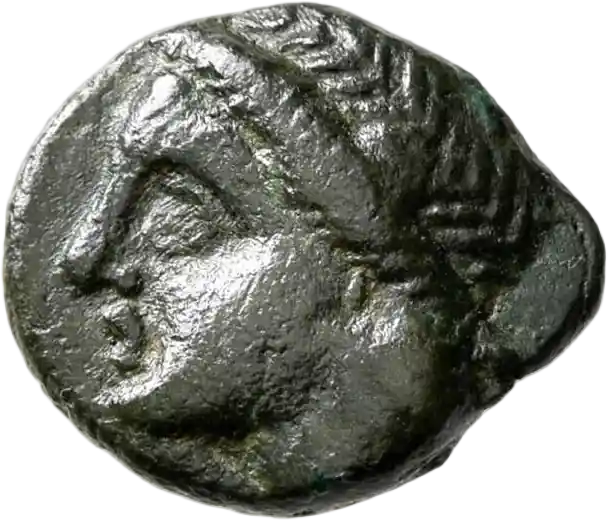
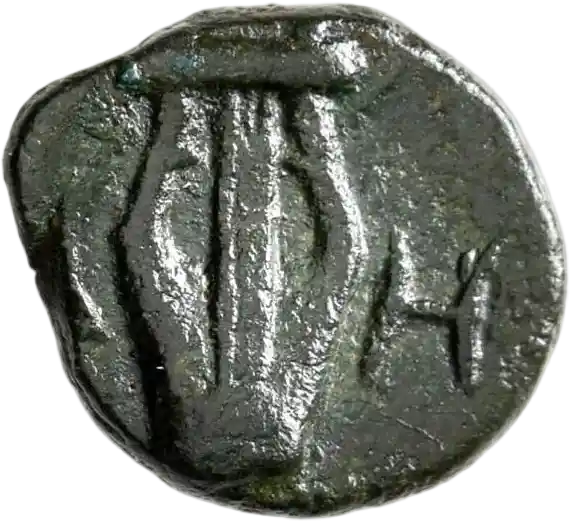
| Description |
CYCLADES, Delos. Circa 280-166 BC. Chalkous (Bronze, 10 mm, 0.68 g, 12 h). Laureate head of Apollo to left. Rev. Δ-H Lyre. BMC 7. HGC 6, 500. SNG Copenhagen 670. Very fine. From the collection of the Hamburg-based Psychologist and Educational Scientist, Prof. Dr. Paul Probst, ex Naumann E-Auction 63, 4 March 2018, 623. |
| Obverse | Laureate head of Apollo to left. |
| Reverse | Δ-H Lyre. |
| ID(s) | BMC 7. HGC 6, 500. |
| Die Axis | 12h |
| Weight | 0.68g |
| Diameter | 10.00mm |
| Grade | Very Fine/VF |
| Year(s) Minted | Struck: 280 BC - 266 BC |
No Links Associated.
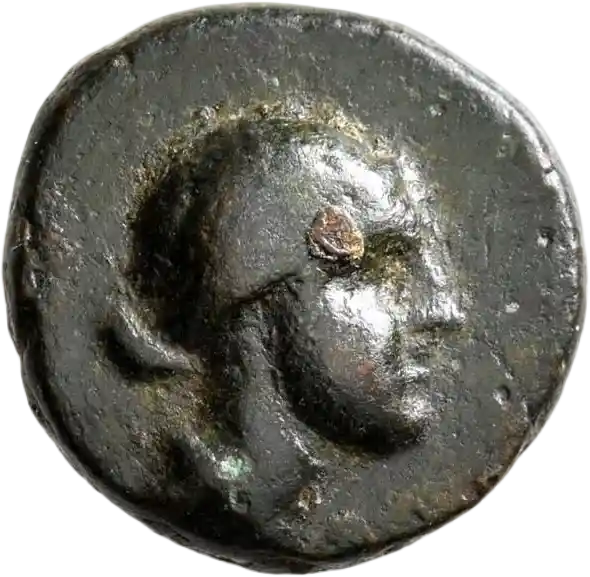
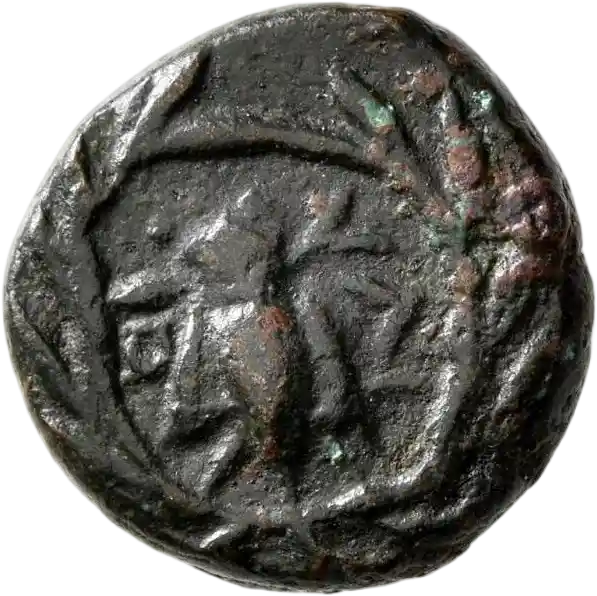
| Description |
CYCLADES, Keos. Ioulis. 1st century BC. AE (Bronze, 12 mm, 2.02 g, 1 h). Head of Aphrodite (or Ktessylla?) to right. Rev. ΙΟ-ΥΛ Bee; all within wreath. BMC 71-3 var. (differing ethnic). HGC 6, 534 var. (differing ethnic). Papageorgiadou-Banis Series XII, 112-47 var. (differing ethnic). SNG Copenhagen 659. Minor spots of corrosion*, otherwise,* nearly very fine. From the collection of the Hamburg-based Psychologist and Educational Scientist, Prof. Dr. Paul Probst, ex Classical Numismatic Group 499, 1 September 2021, 205. |
| Obverse | Head of Aphrodite (or Ktessylla?) to right. |
| Reverse | ΙΟ-ΥΛ Bee; all within wreath. |
| ID(s) | BMC 71-3 var. (differing ethnic). HGC 6, 534 var. (differing ethnic). Papageorgiadou-Banis Series XII, 112-47 var. (differing ethnic). SNG Copenhagen 659. |
| Die Axis | 1h |
| Weight | 2.02g |
| Diameter | 12.00mm |
| Grade | About Very Fine/aVF |
| Year(s) Minted | Struck: 100 BC - 1 BC |
No Links Associated.
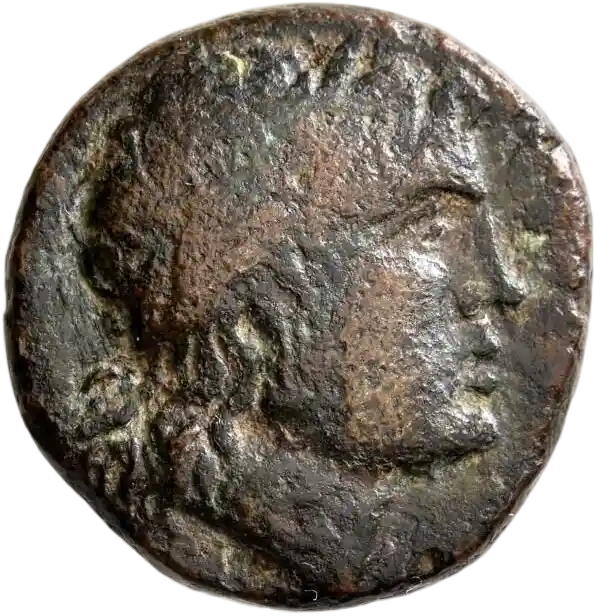
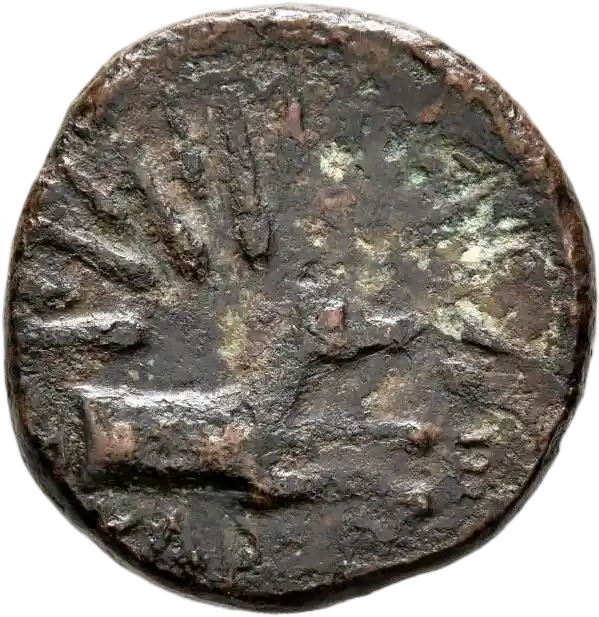
| Description |
CYCLADES, Keos. Karthaia. Late 3rd-early 2nd century BC. AE (Bronze, 19 mm, 5.84 g, 11 h). Laureate head of Apollo to right. Rev. ΚΑΡΘΑΙ Forepart of a dog (Seirios) to right; to left, M; all within circle of rays. BMC 39. HGC 6, 558. Papageorgiadou-Banis Series VIII, Issue 4. SNG Copenhagen 631-2. Minor traces of corrosion*, otherwise,* nearly very fine. From the collection of the Hamburg-based Psychologist and Educational Scientist, Prof. Dr. Paul Probst, assembled since 1975. |
| Obverse | Laureate head of Apollo to right. |
| Reverse | ΚΑΡΘΑΙ Forepart of a dog (Seirios) to right; to left, M; all within circle of rays. |
| ID(s) | MC 39. HGC 6, 558. Papageorgiadou-Banis Series VIII, Issue 4. SNG Copenhagen 631-2. |
| Die Axis | 11h |
| Weight | 5.84g |
| Diameter | 19.00mm |
| Grade | About Very Fine/aVF |
| Year(s) Minted | Struck: 250 BC - 200 BC |
No Links Associated.
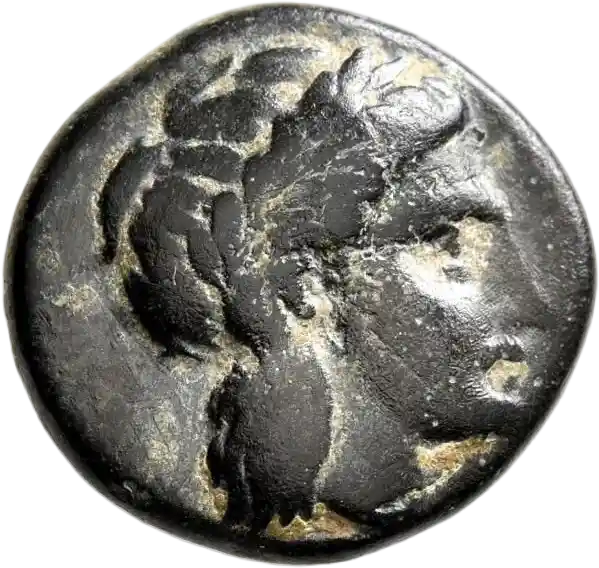
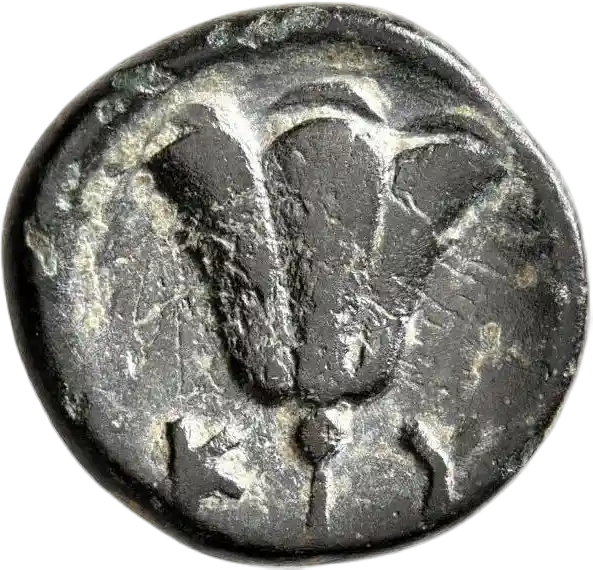
| Description |
CYCLADES, Kythnos. 2nd-1st century BC. AE (Bronze, 17 mm, 3.76 g, 12 h). Laureate head of Apollo to right. Rev. K-Y Rose. BMC 7 var. HGC 6, 610. SNG Copenhagen 664. Very rare. Light deposits and with minor traces of corrosion*, otherwise,* good fine. From the collection of the Hamburg-based Psychologist and Educational Scientist, Prof. Dr. Paul Probst, ex Aquila Numismatics 4, 19 August 2022, 453. |
| Obverse | Laureate head of Apollo to right. |
| Reverse | K-Y Rose. |
| ID(s) | BMC 7 var. HGC 6, 610. SNG Copenhagen 664. |
| Die Axis | 12h |
| Weight | 3.76g |
| Diameter | 17.00mm |
| Grade | Fine/F |
| Year(s) Minted | Struck: 175 BC - 75 BC |
No Links Associated.
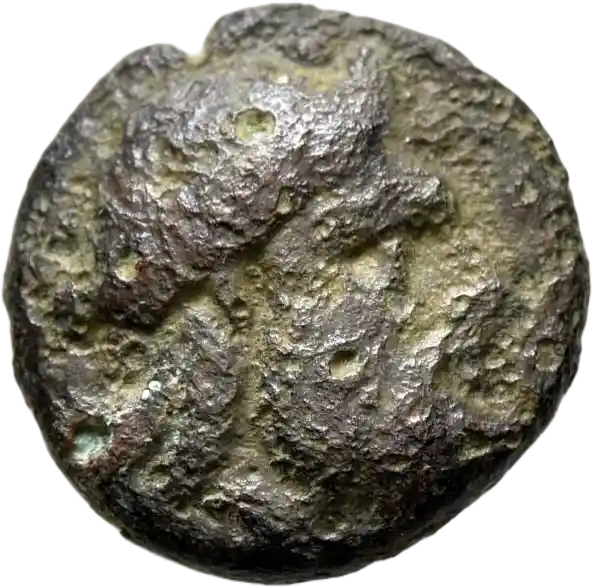
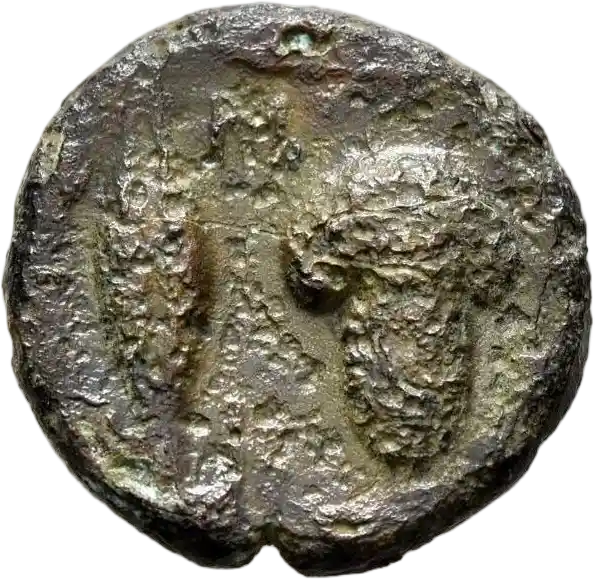
| Description |
CYCLADES, Mykonos. 4th-3rd centuries BC. AE (Bronze, 16 mm, 3.34 g, 7 h). Head of Dionysos to right, wearing ivy wreath. Rev. M-[Y/K-O] Grape bunch; to left, barley grain. BMC 1-2. HGC 6, 616. SNG Copenhagen 698. Very rare. Patina stripped and with traces of corrosion*, otherwise,* fine. From the collection of the Hamburg-based Psychologist and Educational Scientist, Prof. Dr. Paul Probst, ex Leu Web Auction 17, 14 August 2021, 907 and previously from a European collection, formed before 2005. |
| Obverse | Head of Dionysos to right, wearing ivy wreath. |
| Reverse | M-[Y/K-O] Grape bunch; to left, barley grain. |
| ID(s) | BMC 1-2. HGC 6, 616. SNG Copenhagen 698. |
| Die Axis | 7h |
| Weight | 3.34g |
| Diameter | 16.00mm |
| Grade | Fine/F |
| Year(s) Minted | Struck: 350 BC - 250 BC |
No Links Associated.
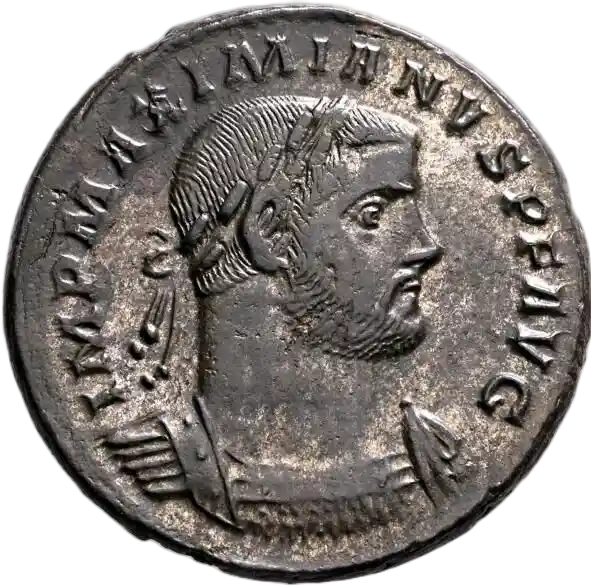
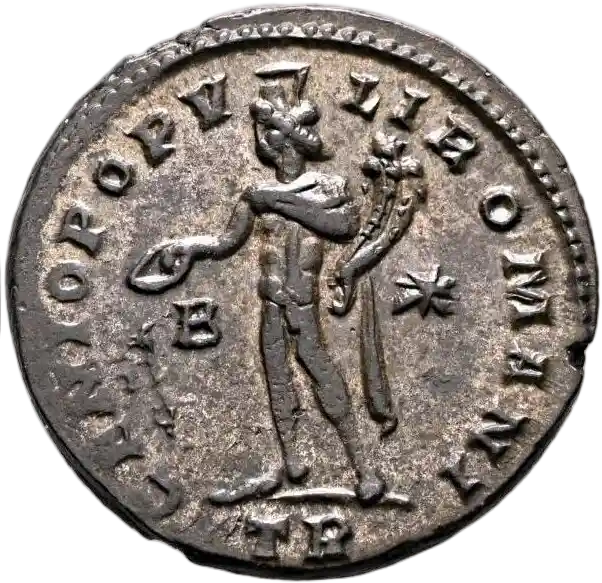
| Description |
Maximianus, first reign, 286-305. Follis (Silvered bronze, 27 mm, 9.52 g, 6 h), Treveri, circa 298-299. IMP MAXIMIANVS P F AVG Laureate and cuirassed bust of Maximianus to right. Rev. GENIO POPV-LI ROMANI / B - ✱ / TR The Genius of the Roman people standing front, head to left, holding patera in his right hand and cornucopiae in his left. E. Ghey: Rauceby Hoard Catalogue, in: ibid. (ed.): Recent Discoveries of Tetrarchic Hoards from Roman Britain and their Wider Context. British Museum Research Publication 236. London 2024, p. 250, 288.5 (this coin). RIC 278b. Minor areas of weakness and with a small scrape on the reverse*, otherwise,* good very fine. From the Rauceby Hoard, found in Lincolnshire in July 2017, submitted for consideration as Treasure to the PAS and returned to the finders (PAS ID: LIN-F6D516, BM Ref: 2017 T649). The Rauceby Hoard was discovered by a detectorist near Ancaster (Lincolnshire) in July 2017, close to Ermine Street, originally a Roman road leading from Londinium (London) to Lindum Colonia (Lincoln) and Eboracum (York). The hoard of over 3000 coins – all tetrarchic folles – was contained in a large ceramic vessel, itself buried at the center of an oval pit lined with quarried limestone. This betrays a deliberate act rather than haphazard burial in the face of danger and, quite possibly, the hoard was a votive offering to the gods. The youngest coin in the hoard was a reduced follis of Maximian, perhaps minted under Constantine I, but no coins of the latter as Augustus were found. This means the hoard was likely buried circa 307, amidst the events of Constantine I's acclamation as Caesar in Eboracum in 306 and his subsequent elevation to the rank of Augustus in December 307. The importance of the hoard further lies in its well-recorded find context and the fact that it is the largest recorded hoard from this period found in Britain to date. |
| Obverse | IMP MAXIMIANVS P F AVG Laureate and cuirassed bust of Maximianus to right. |
| Reverse | GENIO POPV-LI ROMANI / B - ✱ / TR The Genius of the Roman people standing front, head to left, holding patera in his right hand and cornucopiae in his left. |
| ID(s) | E. Ghey: Rauceby Hoard Catalogue, in: ibid. (ed.): Recent Discoveries of Tetrarchic Hoards from Roman Britain and their Wider Context. British Museum Research Publication 236. London 2024, p. 250, 288.5 (this coin). RIC 278b. |
| Die Axis | 6h |
| Weight | 9.52g |
| Diameter | 27.00mm |
| Grade | Good Very Fine/gVF |
| Year(s) Minted | Struck: 298 AD - 299 AD |
No Links Associated.
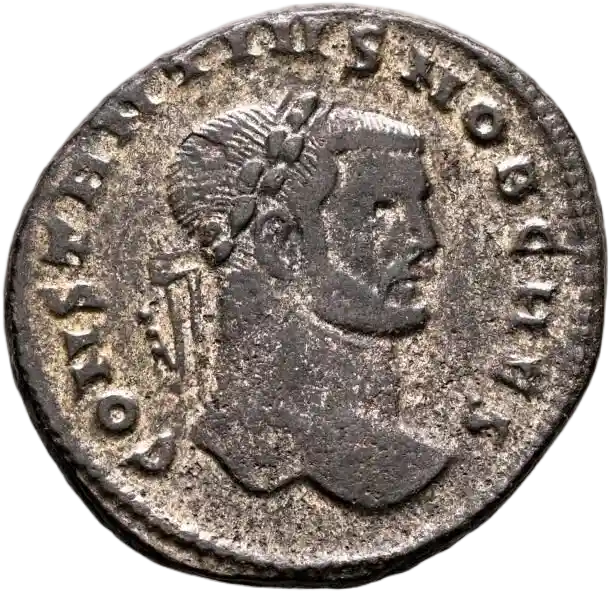
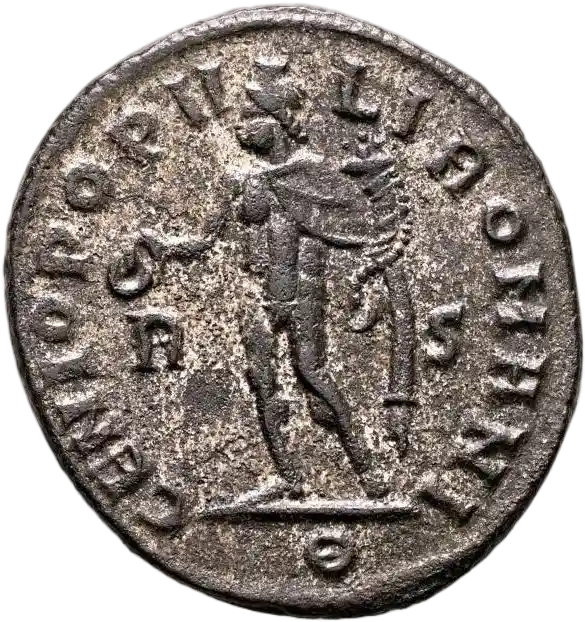
| Description |
Constantius I, as Caesar, 293-305. Follis (Silvered bronze, 27 mm, 7.87 g, 5 h), Rome, circa 297-298. CONSTANTIVS NOB CAES Laureate head of Constantius I to right. Rev. GENIO POPV-LI ROMANI / R - S / Θ The Genius of the Roman people standing front, head to left, holding patera in his right hand and cornucopiae in his left. E. Ghey: Rauceby Hoard Catalogue, in: ibid. (ed.): Recent Discoveries of Tetrarchic Hoards from Roman Britain and their Wider Context. British Museum Research Publication 236. London 2024, p. 277, 827.1 (this coin). RIC 73a. Slightly rough and struck from somewhat worn dies*, otherwise,* very fine. From the Rauceby Hoard, found in Lincolnshire in July 2017, submitted for consideration as Treasure to the PAS and returned to the finders (PAS ID: LIN-F6D516, BM Ref: 2017 T649). The Rauceby Hoard was discovered by a detectorist near Ancaster (Lincolnshire) in July 2017, close to Ermine Street, originally a Roman road leading from Londinium (London) to Lindum Colonia (Lincoln) and Eboracum (York). The hoard of over 3000 coins – all tetrarchic folles – was contained in a large ceramic vessel, itself buried at the center of an oval pit lined with quarried limestone. This betrays a deliberate act rather than haphazard burial in the face of danger and, quite possibly, the hoard was a votive offering to the gods. The youngest coin in the hoard was a reduced follis of Maximian, perhaps minted under Constantine I, but no coins of the latter as Augustus were found. This means the hoard was likely buried circa 307, amidst the events of Constantine I's acclamation as Caesar in Eboracum in 306 and his subsequent elevation to the rank of Augustus in December 307. The importance of the hoard further lies in its well-recorded find context and the fact that it is the largest recorded hoard from this period found in Britain to date. |
| Obverse | CONSTANTIVS NOB CAES Laureate head of Constantius I to right. |
| Reverse | GENIO POPV-LI ROMANI / R - S / Θ The Genius of the Roman people standing front, head to left, holding patera in his right hand and cornucopiae in his left. |
| ID(s) | E. Ghey: Rauceby Hoard Catalogue, in: ibid. (ed.): Recent Discoveries of Tetrarchic Hoards from Roman Britain and their Wider Context. British Museum Research Publication 236. London 2024, p. 277, 827.1 (this coin). RIC 73a. |
| Die Axis | 5h |
| Weight | 7.87g |
| Diameter | 27.00mm |
| Grade | Very Fine/VF |
| Year(s) Minted | Struck: 297 AD - 298 AD |
No Links Associated.
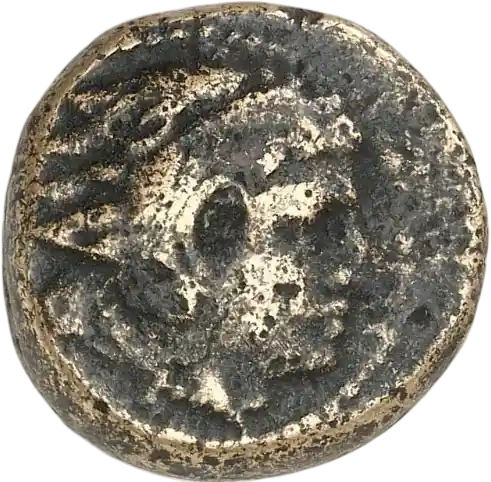
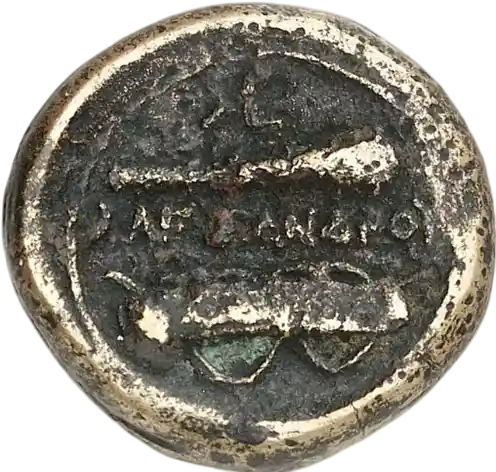
| Description |
Alexander III., 336-323 v. Chr. Æs, 336/323 v. Chr., Amphipolis (?); 6,42 g. Herakleskopf im Löwenfell r.//Keule über Köcher, oben Monogramm. Hoover 925 a; Lathe Biosas -; Price 316. Schön |
| Weight | 6.42g |
| Diameter | 19.00mm |
| Grade | Good Fine/GF |
| Year(s) Minted | Struck: 336 BC - 323 BC |
No Links Associated.
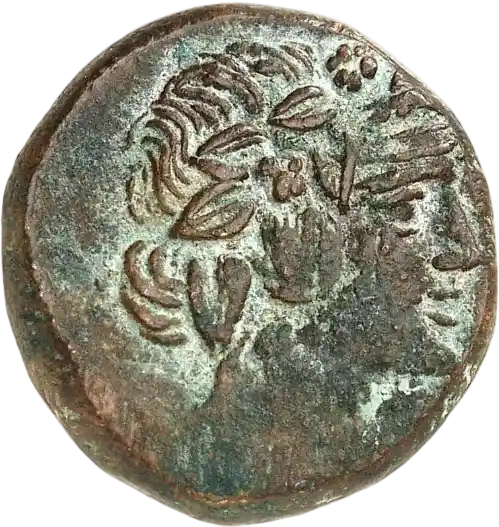
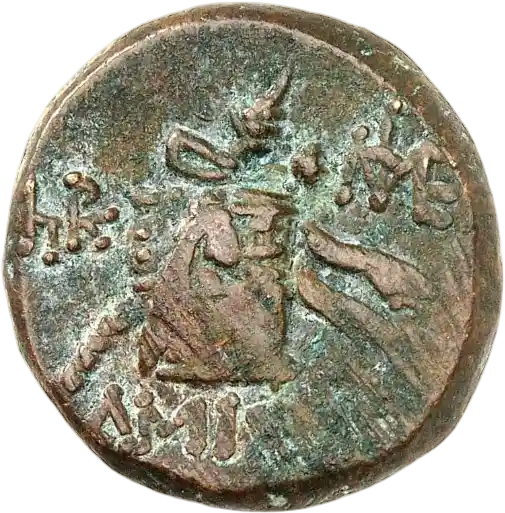
| Description |
Æs, 85/65 v. Chr.; 8,82 g. Dionysoskopf r. mit Efeukranz//Cista mystica, darauf Pantherfell, l. Thyrsos. Hoover 243; Lathe Biosas -; SNG BM 1209. Gutes sehr schön/sehr schön This coin type refers to Dionysus and thus to Mithradates VI of Pontus, who was bynamed “Dionysus”. Although the legend on the coin’s reverse suggests that it was minted by the city of Amisus autonomously, its similarity to coins from other cities (cf. Hoover 452 (Dia), among others) as well as the dating indicate that the actual executing authority was Mithradates VI. Although the latter sought to secure nominal autonomy for the poleis of Asia Minor in Pontos and Paphlagonia (including Amisus and Dia), he did not relinquish control entirely. As a result, the bronze coins of these cities often share the same motifs; this can be observed in this obverse-reverse combination, but also in the “Zeus head/eagle on a thunderbolt” and “Ares head/sword in a scabbard” types. See Price, Martin Jessop, Mithradates VI Eupator, Dionysus, and the Coinages of the Black Sea, NC 8, 1968, pp. 1-12, esp. p. 5. |
| Weight | 8.82g |
| Diameter | 20.00mm |
| Grade | Very Fine/VF |
| Year(s) Minted | Struck: 85 BC - 65 BC |
No Links Associated.
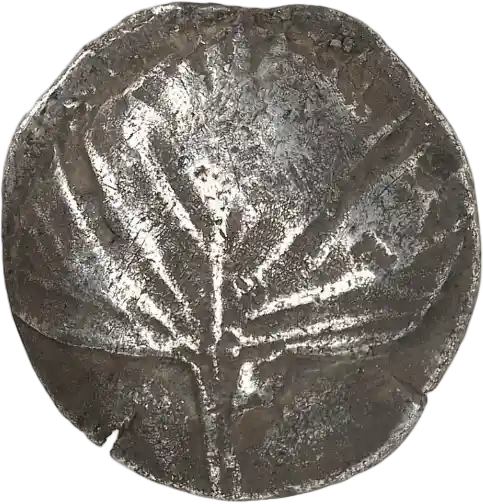
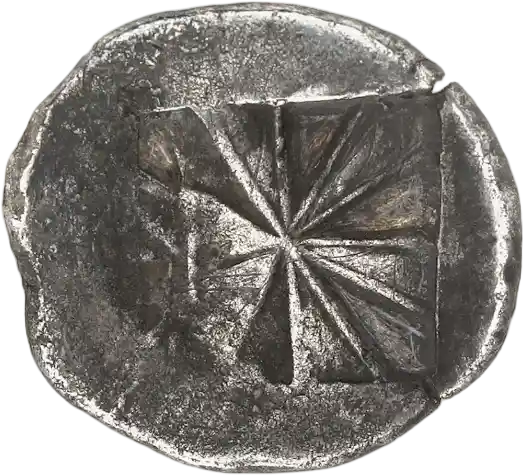
| Description |
AR-Didrachme, 540/515 v. Chr.; 8,34 g. Eppichblatt//Vielfach geteiltes Quadratum Incusum. Arnold- Biucchi, C., The Beginnings of Coinage in the West: Archaic Selinus, S. 16, 6; Hoover 1211; SNG ANS vergl. 672. Herrliche Patina, sehr schön |
| Weight | 8.34g |
| Diameter | 22.00mm |
| Grade | About Very Fine/aVF |
| Year(s) Minted | Struck: 540 BC - 515 BC |
No Links Associated.
1936-02-18
30. RM
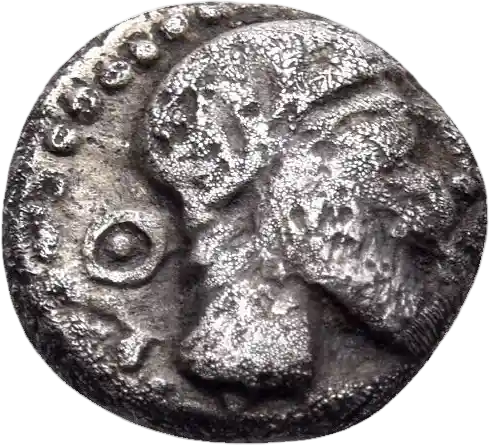
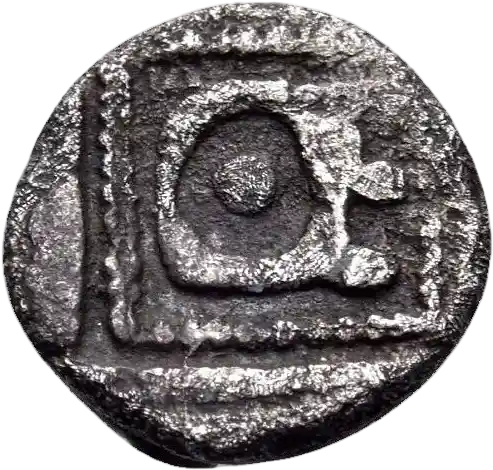
| Description |
IONIA. Magnesia ad Maeandrum. Themistokles, circa 465-459 BC. Hemiobol (Silver, 7.5 mm, 0.39 g, 12 h). Bearded male head (Hephaistos?) to right, wearing a laureate pileus; flanked by Θ - [E]. Rev. Monogram of ΘE in a square dotted frame within an incuse square. Nollé & Wenninger Th5. Nollé Pl. 1, 3. Sheedy Th.H. Extremely rare. Only 11 examples of this denomination were known to Sheedy in 2017. This piece is not in his catalogue. Toned. Porous*, otherwise,* very fine. |
| Die Axis | 12h |
| Weight | 0.39g |
| Diameter | 7.50mm |
| Grade | Very Fine/VF |
| Year(s) Minted | Struck: 465 BC - 459 BC |
No Links Associated.
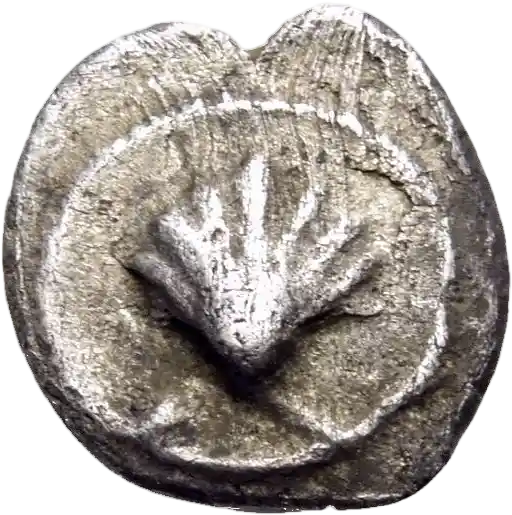
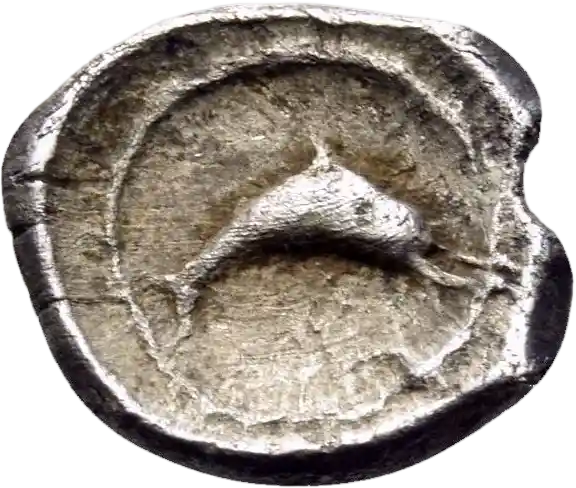
| Description |
CALABRIA. Tarentum. Circa 325-280 BC. Hemilitron (Silver, 8 mm, 0.38 g, 9 h). Cockle shell within linear circle. Rev. Dolphin to right within linear circle. HN III 980. Vlasto 1549. Toned. Nearly very fine. |
| Die Axis | 9h |
| Weight | 0.38g |
| Diameter | 8.00mm |
| Grade | About Very Fine/aVF |
| Year(s) Minted | Struck: 325 BC - 280 BC |
No Links Associated.
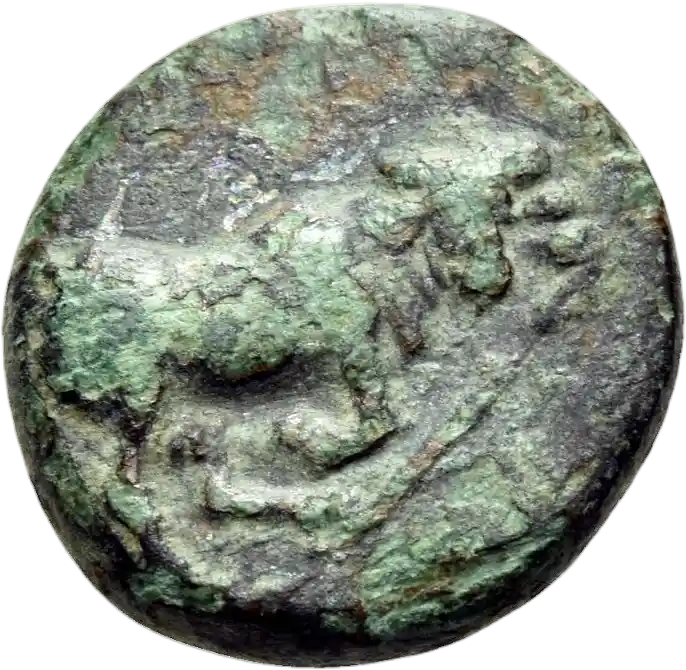
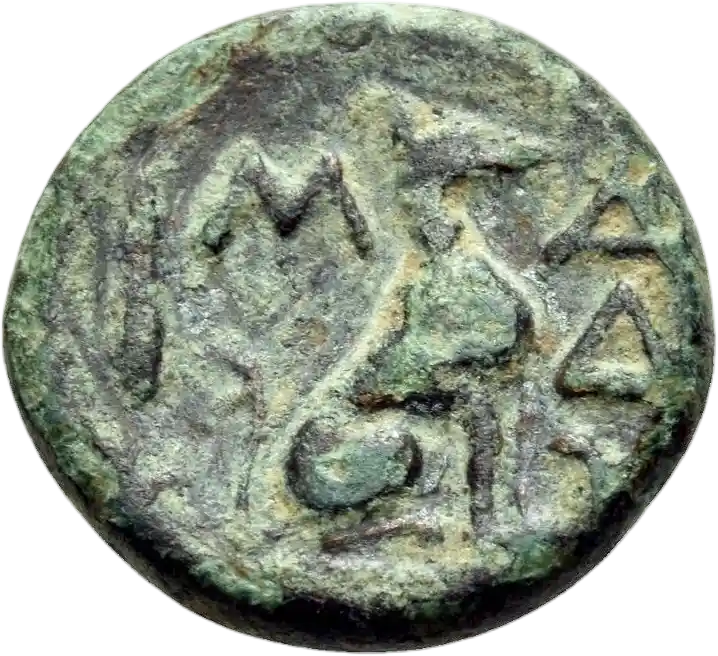
| Description |
THRACE. Madytos. Circa 350 BC. (Bronze, 13 mm, 1.72 g, 9 h). Bull charging to right. Rev. Μ-Α/Δ/Υ Dog seated to right; to left, barley ear. HGC 3.2, 1511. SNG Copenhagen 926. Very rare; green patina. Rough surfaces*, otherwise,* about very fine. |
| Die Axis | 9h |
| Weight | 1.72g |
| Diameter | 13.00mm |
| Grade | About Very Fine/aVF |
| Year(s) Minted | Struck: 350 BC |
No Links Associated.